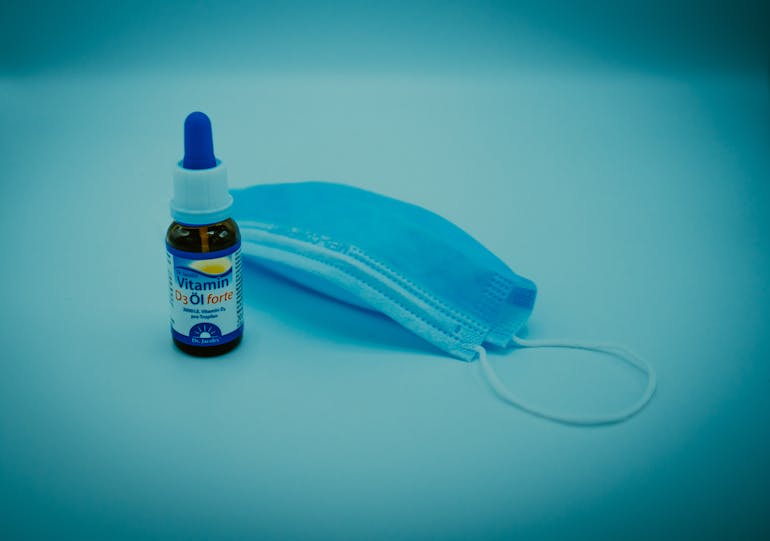From a pharmacist: can vitamin D prevent covid-19? Here’s what we know.
Reviewed and fact-checked by Giulia Guerrini, Superintendent Pharmacist. Read our editorial policy to see how we create informative, accurate content.
Quick Summary
Many studies seem to show the positive effects of vitamin D in preventing and treating covid-19 infections. It’s difficult to say for certain as more trials are needed but we recommend supplementing with vitamin D due to its known immune, bone and muscular health boosting effects.
Vitamin D and Winter
There’s been a lot of talk about vitamin D and how it can potentially help treat or prevent covid-19. We’ve summarised some of the studies that have been released to help you understand how vitamin D might be able to help.
It’s important to note that the outbreak of covid-19 began during the winter months, which has led those studying the virus to believe there’s a seasonal stimulus to it.
Vitamin D is often at its lowest levels in our bodies during the winter months due to the reduced amount of sunlight we’re exposed to, particularly in the northern hemisphere.
There are 2 forms of vitamin D that you’ll usually see in products. There’s vitamin D3 (colecalciferol) and vitamin D2 (ergocalciferol), either of which can be used to treat a vitamin D deficiency.
Check out our range of vitamin D supplements here.
Vitamin D trials and studies
Across the water in the USA, a study found that of the 74% of their patients with severe covid-19 infections, only 32.8% were vitamin D sufficient. Only 9.7% of patients older than 40 years who were vitamin D sufficient succumbed to the infection compared to 20% who had deficiencies.
There was also a study in the UK based on epidemiological data using a nationwide 1958 cohort that looked at lung function, forced vital capacity and respiratory infections in just under 7000 participants over the age of 45. The authors found that the prevalence of respiratory infections had a strong seasonal pattern which is linear with the amount of vitamin D we can produce in our bodies over the course of the year as we go through the seasons.
The possible role of vitamin D in infectious diseases like covid-19 is explained by its regulatory role on acquired immunity and innate immunity. There is a complex interaction between vitamin D, infection and the immune system which immunologists are still trying to understand.
A lot of interesting evidence has come up during these studies. Patients who were vitamin D sufficient had much less of the inflammatory marker, CRP, in their blood than patients who were deficient in vitamin D. This suggests that vitamin D can improve the immune function and have a beneficial effect on the immune system to try and reduce the risk of severe complications from covid-19.
A report which was published recently in The Lancet, a team of researchers determined that, on the basis of trials carried out between 2007 and 2020, vitamin D has protective effects against acute respiratory infections.
One study suggested that intensive care admission can be avoided by patients receiving a high dose of vitamin D. The study was carried out in a Spanish hospital on 50 infected patients. Half were given vitamin D and half weren’t. Of those that were given a dose of vitamin D, only one required intensive care treatment and of the non-vitamin D group, 13 were put into intensive care. Though the study was relatively small it does show some promise.
See great prices on our whole range of vitamin D supplements.
Possible limitations to these trials
Further studies are definitely needed to fully evaluate the role of vitamin D in treating covid-19 and it’s still being debated as to what sort of level is best in order to maximise its effectiveness. Laboratory data showing the effects of Vitamin D on host response to the novel coronavirus are also scarce so this needs to be taken into account.
It’s worth noting that a lot of these studies are based on correlation, which are of low quality and have numerous limitations (such as not adjusting for all factors such as underlying conditions, ethnicity or BMI, to name a few).
Calcifediol does seem to be able to reduce severity of the disease though. However, larger trials with groups properly matched will be required to show a definitive answer.
See our entire range of vitamin D supplements here.
Can you overdose on vitamin D?
Since vitamin D increases the absorption of Calcium, taking too many vitamin D supplements over a long period of time can cause too much calcium to build up in the body (hypercalcaemia). This can weaken the bones and damage the kidneys and the heart.
- Adults, elderly and children between 11-17 years old: do not take more than 100 micrograms (4,000 IU) of vitamin D a day.
- Children aged 1 to 10 years: do not give more than 50 micrograms (2,000 IU) a day.
- Infants under 12 months: do not give more than 25 micrograms (1,000 IU) a day.
Of course, your doctor may suggest you to take a higher or lower dosage of vitamin D, in which case of course follow your doctor’s advice.
We recommend vitamin D
Pending results of further trials, it would seem uncontroversial to enthusiastically promote efforts to achieve reference nutrient intakes of vitamin D, which is around 400 IU/day in the UK.
Vitamin D has benefits on bone and muscle health and whether or not there’s a chance it can help reduce the impact of covid-19 there’s nothing to lose by adding it to your diet as a supplement.
Buy your vitamin D supplements here.
References
Can Vitamin D help combat the coronavirus?
Key messages | COVID-19 rapid evidence summary: vitamin D for COVID-19 | Advice
Vitamin D for COVID-19: a case to answer?
Vitamins and minerals - Vitamin D

